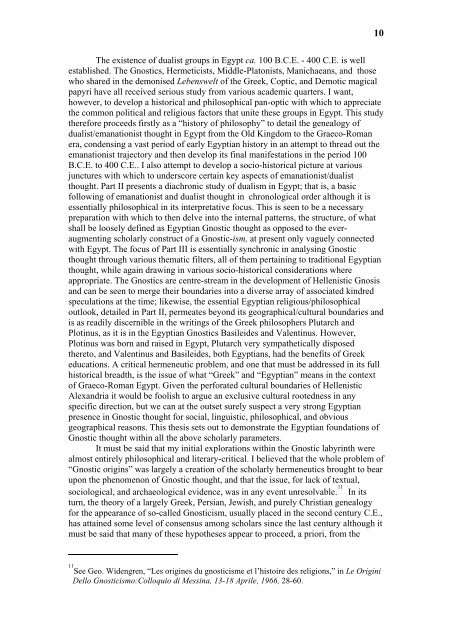THE EGYPTIAN FOUNDATIONS OF GNOSTIC THOUGHT
THE EGYPTIAN FOUNDATIONS OF GNOSTIC THOUGHT
THE EGYPTIAN FOUNDATIONS OF GNOSTIC THOUGHT
You also want an ePaper? Increase the reach of your titles
YUMPU automatically turns print PDFs into web optimized ePapers that Google loves.
The existence of dualist groups in Egypt ca. 100 B.C.E. - 400 C.E. is well<br />
established. The Gnostics, Hermeticists, Middle-Platonists, Manichaeans, and those<br />
who shared in the demonised Lebenswelt of the Greek, Coptic, and Demotic magical<br />
papyri have all received serious study from various academic quarters. I want,<br />
however, to develop a historical and philosophical pan-optic with which to appreciate<br />
the common political and religious factors that unite these groups in Egypt. This study<br />
therefore proceeds firstly as a “history of philosophy” to detail the genealogy of<br />
dualist/emanationist thought in Egypt from the Old Kingdom to the Graeco-Roman<br />
era, condensing a vast period of early Egyptian history in an attempt to thread out the<br />
emanationist trajectory and then develop its final manifestations in the period 100<br />
B.C.E. to 400 C.E.. I also attempt to develop a socio-historical picture at various<br />
junctures with which to underscore certain key aspects of emanationist/dualist<br />
thought. Part II presents a diachronic study of dualism in Egypt; that is, a basic<br />
following of emanationist and dualist thought in chronological order although it is<br />
essentially philosophical in its interpretative focus. This is seen to be a necessary<br />
preparation with which to then delve into the internal patterns, the structure, of what<br />
shall be loosely defined as Egyptian Gnostic thought as opposed to the everaugmenting<br />
scholarly construct of a Gnostic-ism, at present only vaguely connected<br />
with Egypt. The focus of Part III is essentially synchronic in analysing Gnostic<br />
thought through various thematic filters, all of them pertaining to traditional Egyptian<br />
thought, while again drawing in various socio-historical considerations where<br />
appropriate. The Gnostics are centre-stream in the development of Hellenistic Gnosis<br />
and can be seen to merge their boundaries into a diverse array of associated kindred<br />
speculations at the time; likewise, the essential Egyptian religious/philosophical<br />
outlook, detailed in Part II, permeates beyond its geographical/cultural boundaries and<br />
is as readily discernible in the writings of the Greek philosophers Plutarch and<br />
Plotinus, as it is in the Egyptian Gnostics Basileides and Valentinus. However,<br />
Plotinus was born and raised in Egypt, Plutarch very sympathetically disposed<br />
thereto, and Valentinus and Basileides, both Egyptians, had the benefits of Greek<br />
educations. A critical hermeneutic problem, and one that must be addressed in its full<br />
historical breadth, is the issue of what “Greek” and “Egyptian” means in the context<br />
of Graeco-Roman Egypt. Given the perforated cultural boundaries of Hellenistic<br />
Alexandria it would be foolish to argue an exclusive cultural rootedness in any<br />
specific direction, but we can at the outset surely suspect a very strong Egyptian<br />
presence in Gnostic thought for social, linguistic, philosophical, and obvious<br />
geographical reasons. This thesis sets out to demonstrate the Egyptian foundations of<br />
Gnostic thought within all the above scholarly parameters.<br />
It must be said that my initial explorations within the Gnostic labyrinth were<br />
almost entirely philosophical and literary-critical. I believed that the whole problem of<br />
“Gnostic origins” was largely a creation of the scholarly hermeneutics brought to bear<br />
upon the phenomenon of Gnostic thought, and that the issue, for lack of textual,<br />
sociological, and archaeological evidence, was in any event unresolvable. 11<br />
In its<br />
turn, the theory of a largely Greek, Persian, Jewish, and purely Christian genealogy<br />
for the appearance of so-called Gnosticism, usually placed in the second century C.E.,<br />
has attained some level of consensus among scholars since the last century although it<br />
must be said that many of these hypotheses appear to proceed, a priori, from the<br />
11<br />
See Geo. Widengren, “Les origines du gnosticisme et l’histoire des religions,” in Le Origini<br />
Dello Gnosticismo:Colloquio di Messina, 13-18 Aprile, 1966, 28-60.<br />
10










